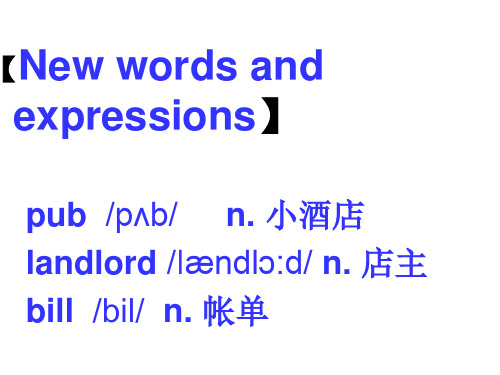新概念第二册 Lesson18讲解学习
- 格式:ppt
- 大小:2.74 MB
- 文档页数:28




Lesson18 He often does this 课⽂内容: After I had had lunch at a village inn, I looked for my bag. I had left it on a chair beside the door and now it wasn't there ! As I was looking for it, the inn-keeper came in. ‘Did you have a good meal ' he asked. ‘Yes, thank you,' I answered, ‘but I can't pay the bill. I haven't got my bag.' The inn-keeper smiled and immediately went out. In a few minutes he returned with my bag and gave it back to me. ‘I'm very sorry,' he said ' My dog had taken it into the garden. He often does this.' 本⽂语法:have的时态和变化 语法归纳:have作实义动词意为“拥有”,作助动词帮助构成完成时态。
1)作实义动词,意为“拥有”(=own, possess,have got): I have over a thousand books. = I own / possess over a thousand books 我有1000 多本书。
Did you have plenty of time to see your mother?你有⾜够的时间去看望你母亲吗? Have you got any views about this new plan?对于这个新计划你有何看法?(在英式⼝语中常⽤ have got代替have。


新概念英语第二册:第18课课文详解及语法解析课文详注 Further notes on the text1.After I had had lunch at a village pub, I looked for my bag.我在一家乡村小酒店吃过午饭后,就找我的提包。
(1)have在have lunch这个词组中是完全动词而不是助动词,所以,像其他完全动词一样,它的过去完成时要加助动词had。
(cf. 本课语法)(2)pub为public house(酒店,酒吧)的缩略形式,在英国英语的口语中较常见:Let's go to the pub for a drink.咱们去酒店喝杯酒吧。
(3)look for强调“寻找”这个动作,而不涉及结果:I looked for my key everywhere, but I couldn't find it.我到处寻找我的钥匙,但还是没找到。
2.I had left it on a chair beside the doo r…我曾把它放在门边的椅子上……leave除了“离去”、“离开”、“出发”的意思,还能够表示“把(人、物)留下”、“遗留”、“丢下”等:The dog has left your bag by a tree.那狗把你的提包丢在了一棵树旁。
Have you left anything in the car?你有没有把什么东西丢在车里?Leave the books on the desk.把书放在课桌上。
3.My dog had taken it into the garden. He often doesthis!我的狗把它弄到花园里去了,他常干这种事!he在这里指代的是狗。
动物通常用it来代表,即被看成像东西一样。
但是,指宠物、家畜或民间故事中的动物时,我们经常也用he,she,who等,即使得它们“人格化”并具有性别。
Lesson18单词讲解ndlord n.店主,房东,业主,老板landowner n.2.bill n.账单,单据,清单/钞票/法案/广告pay the billUS dollar billsa crime billa bill boardLesson18课文&语法讲解本课重点:have的用法实义动词助动词have的用法实义动词1.“有”2.“吃喝玩乐做”助动词have的用法实义动词1.“有”I have a book.She has a car.He had a surprise.2.“吃喝玩乐做”have a meal have breakfast have some water have fun have a good timehave a swimhave的用法实义动词助动词(完成时态中)I have received a letter.She has bought a gift.He had left.have的用法(用法不同,变否定疑问也不同)实义动词助动词(完成时态中)I have received a letter.I have not received a letter.She has bought a gift.She has not bought a gift.He had left.He had not left.have的用法(用法不同,变否定疑问也不同)实义动词I have a book.I do not have a book. She has lunch.She does not have lunch. He had a good time.He did not have a good time.助动词(完成时态中)have的用法(用法不同,变否定疑问也不同)实义动词I have a book.I do not have a book. She has lunch.She does not have lunch. He had a good time.He did not have a good time.助动词(完成时态中)I have received a letter.I have not received a letter.She has bought a gift.She has not bought a gift.He had left.He had not left.have的用法练习:(判断用法,并变否定疑问)1.You have a lot of money.2.They had a swim yesterday.3.She has eaten breakfast.4.My dog had taken it into the garden.have的用法练习:(判断用法,并变否定疑问)1.You have a lot of money.2.They had a swim yesterday.3.She has eaten breakfast.4.My dog had taken it into the garden.have的用法练习:(判断用法,并变否定疑问)1.You have a lot of money.You do not have a lot of money.2.They had a swim yesterday.They did not have a swim yesterday.3.She has eaten breakfast.She has not eaten breakfast.4.My dog had taken it into the garden.My dog had not taken it into the garden.have的用法补充两点:“有”have=have got实义动词助动词You have a lot of money.=You have got a lot of money.do not have have not got have的用法补充两点:1.“有”have=have got2.have/has had had hadI had had lunch at a village.We have had trouble with the plan.It has had no effect.1.After I had had lunch…,I looked for my bag.have的过去完成时一般过去时先后2.I had left it on a chair beside the door and now it wasn’t there!beside the doorBesides this book,I have some others.3.As I was looking for it,the landlord came in.4.“Did you have a good meal?”he asked.5.“but I can’t pay the bill.I haven’t got my bag.”6.My dog had taken it into the garden.本课重点:have的用法实义动词助动词Lesson18知识拓展本课重点:if真实条件句(假设将来)Lesson18知识拓展本课重点:have的用法实义动词助动词have的用法实义动词“有”“吃喝玩乐做”助动词(完成时态中)have的用法He had a smoke after dinner.My friend Bill has had a headache.have的用法Their guest room has two big windows.We had had a long vacation after that.本课重点:have的用法实义动词助动词。
新概念第二册Lesson 18复习要点一.L18词汇讲解:1.pub 小酒店bar 酒吧book bar 书吧/tea bar 茶吧/ internet bar 网吧ndlord 店主land 土地lord 领主Lord of Ring 指环王3.bill 账单pay the bill 付账Bill,please./Check, please.结账。
二.重难点:1.have got/has got 有/得了某种疾病,当have 或者has 的意思是“有,得病”的使用,可以互换2.give up 放弃,投降give in 投降/上交give away 送人区分give in 和give up 的不同:The soldiers lost the battle but they didn’t give themselves up . 士兵们输掉了战斗,但是他们没有投降。
The soldiers didn’t give in.士兵们没有投降。
3.a village pun 村庄的小酒馆an apple tree 一棵苹果树a woman doctor 一位女医生注意:two apple trees /two women doctors4.look for 强调动作或者过程find强调结果类比:look at/see listen to/hear put on/wear。
5.leave sb. sth/leave sth. for sb.给某人留下某物6.return的含义返回:He’ll return to his country in 2 years.他两年之后会回来。
返还,偿还:I’ll return your money soon.我会很快还你的钱。
7.几个“除......之外”的词和短语:besides/except/apart from/except fromapart from和except for 可用于句首。